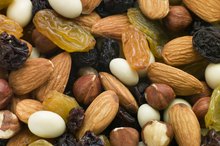What does fact checked mean?
At Healthfully, we strive to deliver objective content that is accurate and up-to-date. Our team periodically reviews articles in order to ensure content quality. The sources cited below consist of evidence from peer-reviewed journals, prominent medical organizations, academic associations, and government data.
The information contained on this site is for informational purposes only, and should not be used as a substitute for the advice of a professional health care provider. Please check with the appropriate physician regarding health questions and concerns. Although we strive to deliver accurate and up-to-date information, no guarantee to that effect is made.
What to Eat & Not Eat in Preparation for a Colonoscopy
A colonoscopy is a procedure that examines the inside of your colon. Prior to examination, your doctor may recommend that you consume certain foods while avoiding others to ensure a successful procedure. A clear liquid diet is typically recommended one day before the procedure. Consult with your health care provider for a full list of colonoscopy preparation instructions 1.
Colonoscopy
During a colonoscopy, a flexible instrument known as a colonscope is inserted through the rectum to examine the inside of the colon. The doctor looks for early signs of colorectal cancer or any unexplained changes in your bowel. The procedure also enables a doctor to evaluate and detect inflamed tissues, ulcers, abnormal growths and intestinal bleeding. The entire procedure takes 30 to 60 minutes and you should fully recover by the next day.
- During a colonoscopy, a flexible instrument known as a colonscope is inserted through the rectum to examine the inside of the colon.
- The procedure also enables a doctor to evaluate and detect inflamed tissues, ulcers, abnormal growths and intestinal bleeding.
Preparation Diet
Fiber for a Colonoscopy
Learn More
The day before the procedure, your health care provider will recommend to begin a clear liquid diet. A clear liquid diet is intended to clear the gastrointestinal tract of any solids. Clear liquids are easily absorbed and will provide vital fluids for the body prior to surgery. A clear liquid diet does not provide all the essential nutrients and as such, you should only follow it for a short period of time. In addition to a liquid diet, your health care provider may recommend an oral laxative to increase bowel movements and further empty the bowel.
- The day before the procedure, your health care provider will recommend to begin a clear liquid diet.
- A clear liquid diet does not provide all the essential nutrients and as such, you should only follow it for a short period of time.
What to Eat
Clear liquids include anything you can see through. Examples of acceptable clear liquids include water, soft drinks, plain coffee, herbal teas and electrolyte sport drinks. Other clear liquids include fat-free chicken or beef broth, gelatin, ice pops and clear hard candy. Fruit juices such as apple, grape and cranberry without pulp are also acceptable clear liquids. You can add sugar, salt and lemon to your liquids to improve flavor. Ask your health care provider about clear liquid nutritional supplements.
- Clear liquids include anything you can see through.
- Fruit juices such as apple, grape and cranberry without pulp are also acceptable clear liquids.
What Not to Eat
How to Clean a Colon Before Surgery
Learn More
In general, avoid all solid and fibrous foods. You should also avoid milk, juices with pulp, meat and vegetable soups and mixed drinks. Additionally, you should avoid all beverages and foods that contain artificial red or purple dyes as these dyes mask the lining of the colon.
Related Articles
References
- Virginia Mason Kirkland: Colonoscopy Preparation Planner.
- Thorell, A, MacCormick, AD, Awad, S, et al. Guidelines for perioperative care in bariatric surgery: Enhanced Recovery After Surgery (ERAS) Society recommendations. World J Surg. 2016;40:2065. doi:10.1007/s00268-016-3492-3
- Oates JR, Sharma S. Clear liquid diet. StatPearls. Updated March 18, 2019.
- Swanson SM, Strate LL. Acute colonic diverticulitis. Ann Intern Med. 2018;168(9):ITC65-ITC80. doi:10.7326/AITC201805010
- Forbes A, Escher J, Hebuterne X, et al. ESPEN guideline: Clinical nutrition in inflammatory bowel disease. Clinical Nutrition. 2017;36(2):321-47. doi:10.1016/j.clnu.2016.12.027
- MedlinePlus. Clear liquid diet. Updated July 14, 2018.
- U.S. Department of Health and Human Services, U.S. Department of Agriculture. 2015–2020 Dietary guidelines for Americans. Eighth edition.
Writer Bio
Anthony Isaac Palacios has been a professional writer for more than five years for various media including magazine, newspaper and the Internet. He has a Master of Science in dietetics and nutrition and specializes in health and nutrition articles for the general public. Palacios enjoys cooking with wine, and sometimes even adding it to the food.









